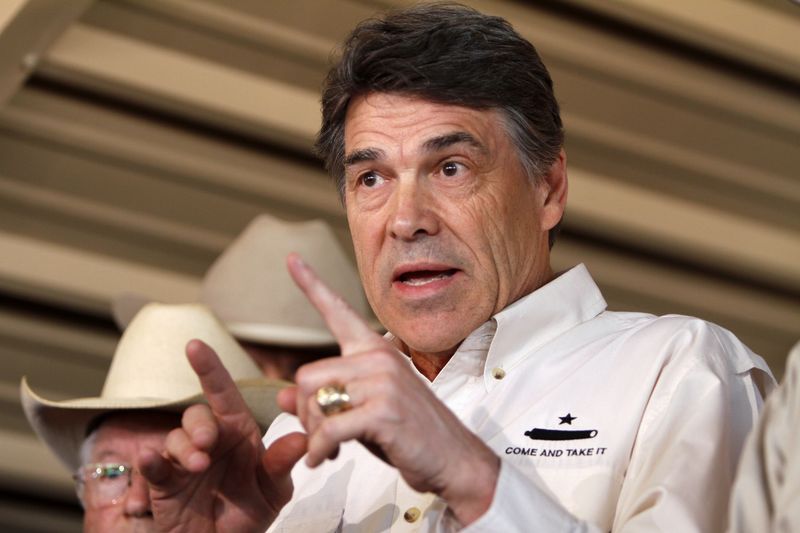By Valerie Volcovici and Amanda Becker
WASHINGTON (Reuters) - Rick Perry's farewell speech to the Texas legislature listed the accomplishments expected from an outgoing Republican governor of the country's largest oil-producing state. But his Jan. 15 speech also did something less predictable: touting his environmental record, from lowering Texas' carbon emissions to turning the state into a global leader in wind energy production.
"We have expanded our economy while protecting our environment," said Perry, who is openly exploring a second White House run in 2016.
It was a greener message than the one he delivered ahead of his last presidential campaign, when he called climate change a "contrived phony mess," and it reflects an expectation among some in the party that voters in 2016 will want Republican candidates to develop a more sophisticated climate change message.
"'I'm not a scientist' won't be a winner in the presidential field," Republican strategist Ford O'Connell said of the now common response Republican lawmakers and candidates offer when asked about climate change.
With the national party largely silent on the issue, conservative environmental groups like ConservAmerica are stepping up efforts to sharpen the Republican message. In recent months they have held meetings for like-minded conservatives and met with lawmakers and aides in a bid to help craft a new Republican environmental platform.
Attempts to strike a softer tone will collide with entrenched resistance, primarily from the donor network in the orbit of billionaire brothers Charles and David Koch, who oppose any attempt to regulate the oil, gas and chemical industries that are the backbone of their empire.
Conservative political advocacy groups supported by the Kochs plan to spend $889 million in 2016, the Washington Post said on Monday.
Those pushing the party to adopt a more palatable message on the environment say it is possible to stake out environmental positions that can appeal to young and independent voters without offending the party's free-market, anti-regulation base.
Perry spokeswoman Lucy Nashed said the outgoing governor has long called smart regulations in Texas "proof that economic growth and environmental protection are not mutually exclusive."
ELECTORAL SHIFT
The search for a new message on climate change is driven by electoral math.
While leaders of the Republican-controlled Congress have vowed to block regulations to control carbon emissions, a poll by Yale University earlier this month found that 56 percent of Republicans support regulating climate-warming greenhouse gases.
"Red state disputation of science isn't going to work," said former South Carolina congressman Bob Inglis, noting that voters skew younger and more independent during presidential election cycles.
Inglis, who lost his seat in 2010 partly due to saying humans cause climate change, went on to found the Energy and Enterprise Initiative at George Mason University. The group wants to offer a "ladder" to "get as many Republicans off the limb they are out on regarding climate change," Inglis said.
ConservAmerica has a similar aim. The group wants the Republican Party to embrace its history of conservation established by President Teddy Roosevelt at the beginning of last century. ConservAmerica dropped "environmental" from its name, stocked its board with market-minded business leaders and recently brought on a Washington strategist to coordinate conversations with dozens of congressional offices.
In a full-color brochure it takes to meetings, ConservAmerica urges Republicans to consider crafting "market-based solutions" to climate change. The domestic production of natural gas, nuclear energy and vehicle efficiency standards are among suggested steps. Many have been privately receptive, the group said.
Board member Paul Walker, who advises utilities and investment firms on regulatory risk, said it was important that Republicans not cede the issue to Democrats and take into account Wall Street's perspective.
Forums hosted by Citizens for Responsible Energy Solutions (CRES), the Conservation Leadership Council and Concord51 have become a venue for Republicans to start talking about climate change. In early December, New Hampshire Senator Kelly Ayotte touted her state's use of technology to reduce coal plant emissions lest it become the "tail pipe of the Midwest."
"I hope all of you in this room can count me in on it, and that we can actually get to legislating on some of these issues," Ayotte said.
An executive from a utility company in the northeast said he had no idea a Republican environmental movement existed until he was invited to the forum.
The schism within the party was apparent in a series of Senate votes last week, when Democrats proposed amendments to a bill to green-light TransCanada Corp's Keystone XL pipeline that would transport crude oil from Canada's oil sands to the U.S. Gulf coast.
The symbolic amendments asked lawmakers to go on record about whether climate change is real, not a hoax, and caused by human activity.

Senators Rand Paul of Kentucky and Lindsey Graham of South Carolina were among 15 Republicans who acknowledged a human role. Senators Marco Rubio of Florida and Ted Cruz of Texas acknowledged climate change, but not that it is caused by humans. All are potential White House contenders.